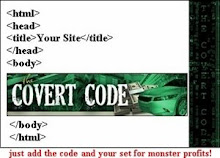
Can you create a beautiful page
with a simple Note pad editor? The answer is, of course you can. You can write HTML in MS word or with your hosting provider. Manual HTML now a days is considered old school if not prehistoric by some folks. Webpage designers can create just as beautiful pages with HTML editors as they can with DreamWeaver or FrontPage. The biggest advantage that Dreamweaver has is that the designer doesn't have to know HTML to put up a webpage on the internet.Free Editors
Text HTML Editors
is the type of editor I use every day. I use HomeSite for big jobs and vi for small edits. Text editors provide a lot of control and speed for Web Developers. A Developer who understands HTML can often edit Web pages much more quickly using a text editor than another developer can using WYSIWYG. If you're planning on doing Web Development professionally, hiring managers want employees who know HTML.here are a few free editors from a trusted site
CNETdownload.com
HTML kit
Note Pad ++ 5.3
1st Page 2000
Em Editor
Coffee cup
Page Breeze - note with page breeze your computer must have windows visual c++
HTML kit
Note Pad ++ 5.3
1st Page 2000
Em Editor
Coffee cup
Page Breeze - note with page breeze your computer must have windows visual c++
Why WYSIWYG?
Most Developers have a decided opinion about whether to use a WYSIWYG editor or a text editor. I prefer text editors, and only use WYSIWYG editors when pressed. Text editors are usually faster to edit HTML changes, and they don't add in unexpected tags. WYSIWYG editors are usually easier to use and don't require a knowledge of HTML. I also like text editors because they can easily support new formats like XML.
The question is? Do you generate enough pages to fork up the cash
for an expensive webpage editor? If you are a serious website administrator and you need to do some heavy duty page design you may want to look into the paid versions of HTML and WYSIWYG editors that are more automated and save a bit of time in the long run, but if you use the old school versions of HTML editors long enough you will be able to zip though a page just as fast as the fancy bells and whistles of new modern editors. An old fashion HTML editor is a little easier on the wallet; meaning free. There are some good modern Editors on the market available, in both WYSIWYG and the text editor flavors. These editors are fully functional and offer many of the same benefits as their free older cousins, but of course they offer more quicker shortcuts and bells and whistles.
Other things you should consider. When choosing an Editor are:
- Does it include a validator?
- Does it support XML, JSP, PHP, and other languages besides XHTML?
- can you extend it with add-ins or extra functionality?
- Is there a large user-base to get help?
- Are there support pages or help available from the publisher
- Dusty Crawford
online product reviewer
Did you find this article useful? Please feel free to leave a
comment below.
Here are Some













No comments:
Post a Comment